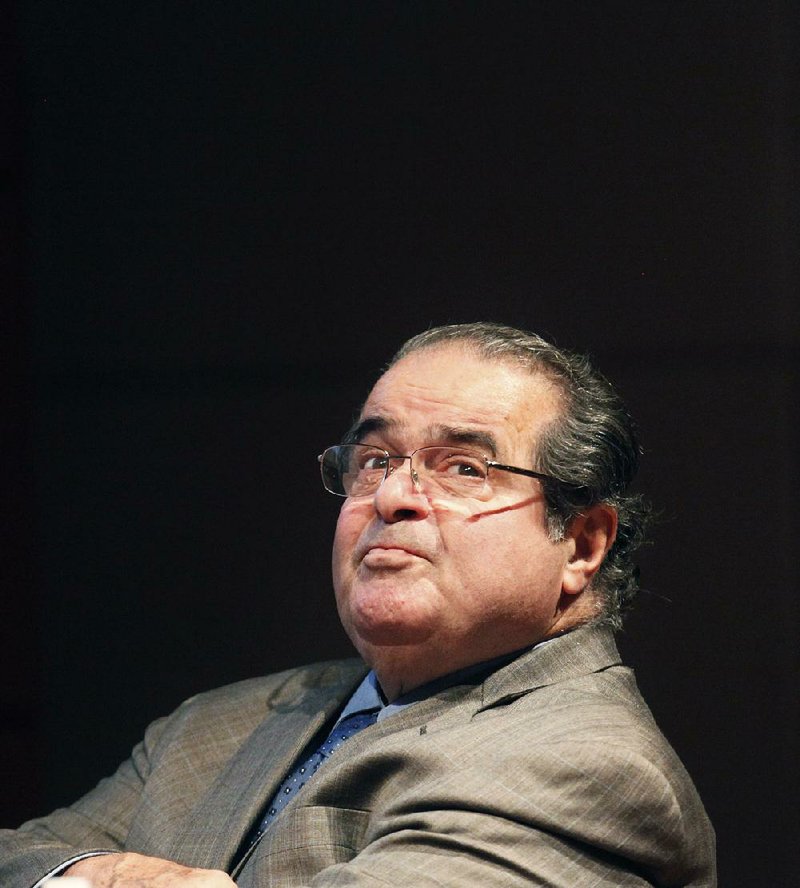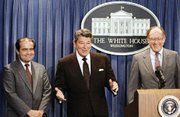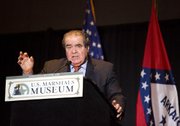U.S. Supreme Court Justice Antonin Scalia was found dead Saturday at a resort in west Texas, according to a statement from Chief Justice John Roberts Jr.
Scalia was 79.
"I am saddened to report that our colleague Justice Antonin Scalia has passed away," Roberts said in an email. "He was an extraordinary individual and jurist, admired and treasured by his colleagues."
The U.S. Marshals Service in Washington confirmed that Scalia died in a private residence in the Big Bend area of west Texas. Spokesman Donna Sellers said Scalia had gone to his room the previous evening and was found dead Saturday morning after he did not appear for breakfast. The cause of death was not immediately released.
President Ronald Reagan selected Scalia for the high court in 1986. On the bench, Scalia advocated for originalism, a constitutional interpretation that looks to the meaning of words and concepts as they were understood by the Founding Fathers.
Scalia was held in deep affection even by his ideological opposites, Justices Ruth Bader Ginsburg and Elena Kagan. Scalia and Ginsburg shared a love of opera. Scalia persuaded Kagan to join him on hunting trips.
Ginsburg once said that Scalia was "an absolutely charming man, and he can make even the most sober judge laugh." She said she urged her friend to tone down his dissenting opinions "because he'll be more effective if he is not so polemical. I'm not always successful."
A smoker of cigarettes and pipes, Scalia enjoyed baseball, poker, hunting and the piano. He was an enthusiastic singer at court Christmas parties and other musical gatherings, and once appeared on stage with Ginsburg as a Washington Opera extra.
He was in the court's majority in the 2000 Bush v. Gore decision, which effectively decided the presidential election for Republican George W. Bush. "Get over it," Scalia famously said at speaking engagements in the ensuing years whenever the topic arose.
He could be unsparing even with his allies. In 2007, Scalia sided with Roberts in a decision that gave corporations and labor unions wide latitude to air political ads close to elections. Yet, Scalia was upset that Roberts' opinion did not explicitly overturn an earlier decision.
Quick-witted and talkative, Scalia was among the most frequent and quotable interrogators of the lawyers who appeared before the high court.
During Scalia's first argument session as a court member, Justice Lewis F. Powell leaned over and asked a colleague, "Do you think he knows that the rest of us are here?"
Scalia's sometimes withering questioning helped transform the bench into one that Roberts has said has become too animated, with the justices interrupting the lawyers and one another during sessions.
Scalia was committed to originalism, which he later began calling textualism. Judges had a duty to give the same meaning to the Constitution and laws as they had when the laws were written, he argued. Otherwise, he said, judges could decide that "the Constitution means exactly what I think it ought to mean."
Scalia disdained the use of legislative history -- statements from members of Congress about the meaning and purposes of laws -- in the judicial interpretation of statutes. He railed against vague laws that did not give potential defendants fair warning of what conduct was criminal, and he was critical of Supreme Court opinions that did not provide lower courts and litigants with clear guidance.
A 2008 challenge to a Washington, D.C., gun ban, Heller v. District of Columbia, gave Scalia the opportunity to display his devotion to textualism. In a 5-4 decision that split the court's conservatives and liberals, Scalia wrote that an examination of English and colonial history made it exceedingly clear that the Second Amendment protected Americans' right to have guns, at the very least in their homes and for self-defense.
"Undoubtedly some think that the Second Amendment is outmoded in a society where our standing army is the pride of our Nation, where well-trained police forces provide personal security, and where gun violence is a serious problem. That is perhaps debatable, but what is not debatable is that it is not the role of this Court to pronounce the Second Amendment extinct," Scalia wrote.
His dissents in cases involving gay rights could be biting. "By formally declaring anyone opposed to same-sex marriage an enemy of human decency, the majority arms well every challenger to a state law restricting marriage to its traditional definition," Scalia wrote in dissent in 2013 when the court struck down part of a federal anti-gay marriage law. Six months later, a federal judge in Utah cited Scalia's dissent in his opinion striking down that state's constitutional ban on same-sex marriage.
Scalia also was passionate about the death penalty. He wrote for the court when in 1989 it allowed states to use capital punishment for killers who were 16 or 17 when they committed their crimes. He was on the losing side in 2005 when the court changed course and declared it unconstitutional for states to execute killers that young.
"The Court thus proclaims itself sole arbiter of our Nation's moral standards -- and in the course of discharging that awesome responsibility purports to take guidance from the views of foreign courts and legislatures," Scalia wrote in dissent.
In 2002, Scalia blasted a decision that invoked the constitutional ban on cruel and unusual punishment to bar executions of mentally disabled killers. "Seldom has an opinion of this court rested so obviously upon nothing but the personal views of its members," Scalia said in his dissent.
Also in 2002, Scalia joined a 5-4 decision that upheld a school voucher program for the first time. He opposed the use of race in college admissions, voting to strike down two affirmative action programs at the University of Michigan in 2003.
Scalia supported free-speech rights, but complained about them too. "I do not like scruffy people who burn the American flag," he said in 2002, but "regrettably, the First Amendment gives them the right to do that."
He issued a blistering dissent in 2015 when a 5-4 majority interpreted the Patient Protection and Affordable Care Act as allowing critical tax subsidies nationwide. Scalia said the majority defied the law's clear language, calling the court's reasoning "pure applesauce" and "interpretive jiggery-pokery."
A longtime law professor before becoming a judge, Scalia frequently spoke at law schools and to other groups. He visited Arkansas for lectures twice in the past year, speaking at Arkansas State University in Mountain Home in April and in the Winthrop Paul Rockefeller Distinguished Lecture Series in Fort Smith last February.
Many friends in Arkansas
Scalia was born on March 11, 1936, in Trenton, N.J. His father was Salvatore Eugene Scalia, an Italian immigrant who became a professor of languages at Brooklyn College. His mother was the former Catherine Panaro, a public-school teacher whose parents had migrated from Italy. He was their only child.
Scalia grew up in New York's Queens borough, where he attended Catholic schools. He studied at the University of Fribourg in Switzerland in 1955 and 1956. Scalia graduated first in his class at Georgetown University and won high honors at the Harvard University Law School.
He worked at a large Cleveland law firm for six years before joining the faculty of the University of Virginia's law school. He left that job to work as legal counsel in the administrations of Presidents Richard Nixon and Gerald Ford.
From 1977-82, Scalia taught law at the University of Chicago.
He then was appointed by Reagan to the U.S. Circuit Court of Appeals for the District of Columbia. Scalia and his wife, Maureen, had nine children.
Scalia had many friends in Arkansas, including Harvard classmate Richard Arnold, who went on to serve on the 8th U.S. Circuit Court of Appeals from 1980 until his death in 2004.
Arnold, who finished first in their 1960 class at Harvard, and Scalia, who finished second, were lifelong friends, said Arnold's brother Morris, who is a senior judge on the 8th U.S. Circuit Court of Appeals.
"They rose to a lot of merriment whenever they were together, which was frequent," Morris Arnold said. "They were very good friends."
Scalia was the first speaker in the inaugural Arnold Lecture in October 2004 at the University of Arkansas at Little Rock William H. Bowen School of Law.
"Justice Scalia was the first speaker in that series, and it was indicative of his friendship with Richard Arnold," said Philip Anderson, a founding partner at Williams & Anderson law firm in Little Rock and president of the American Bar Association from 1998-99.
Morris Arnold hosted Scalia and his wife for dinner when they visited Little Rock for that lecture, and Scalia and his wife returned the favor in Washington.
"He was a very engaging and warm person," Morris Arnold said, adding that Scalia had "a very attractive personality, which gained him a lot of friends, even among people with whom he had very large and great disagreements."
Anderson considers himself among those who called Scalia a friend and respected Scalia despite having differing views on the law and politics.
"We found ourselves on opposite sides of many of the issues, but we were frequently together, and I had great respect for him," Anderson said.
Tributes piled up Saturday for Scalia, who was the longest-serving member on the current court. He "was the solid rock who turned away so many attempts to depart from and distort the Constitution," Texas Gov. Greg Abbott said in a statement.
U.S. Sen. Ted Cruz of Texas, a Republican candidate for president, said Scalia "will go down as one of the few justices who single-handedly changed the course of legal history." U.S. Sen. Dick Durbin, D-Ill., who frequently disagreed with Scalia, said the justice was "steadfast and true to his beliefs."
Naming a successor
Scalia's death leaves President Barack Obama with the decision of when to nominate a successor.
The immediate effect of his death for the current term means that the justices can now be divided 4-4 in some cases. If there is a tie vote, the lower-court opinion will remain in place. Cases in which the current court was expected to split 5-4 include disputes over abortion, affirmative action, mandatory union fees and immigration policy.
Senate Majority Leader Mitch McConnell, R-Ky., as well as Republican presidential candidates Cruz and Marco Rubio, said the nomination should fall to the next president, not Obama.
"The American people should have a voice in the selection of their next Supreme Court Justice," McConnell said in a statement. "Therefore, this vacancy should not be filled until we have a new President."
"It would be wise for everybody to wait until the next president is chosen," Sen. Orrin Hatch, R-Utah, said Saturday on Fox News. "Seeing the type of judges that the president has appointed, there aren't many Republicans who are going to differ with Majority Leader McConnell."
"What is less than zero? The chances of Obama successfully appointing a Supreme Court Justice to replace Scalia?" wrote Conn Carroll, a spokesman for Sen. Mike Lee of Utah, a Republican member of the Judiciary Committee.
That stance angered Democrats, with U.S. Sen. Harry Reid, the chamber's top Democrat, saying it would be "unprecedented in recent history" for the court to have a vacancy for a year. "Failing to fill this vacancy would be a shameful abdication of one of the Senate's most essential constitutional responsibilities," he said.
Obama said he plans to fulfill his constitutional responsibility and nominate a successor.
"There will be plenty of time for me to do so and for the Senate to fulfill its responsibility to give that person a fair hearing and a timely vote," he said. "These are responsibilities that I take seriously as should everyone." He called the decision "bigger than any one party" and said it is about democracy.
White House officials would not comment Saturday evening about deliberations on a potential nominee.
Obama has nominated two justices to the court in the past, and he has expressed the desire to have jurists who have empathy. He did not discuss his thinking about that Saturday night. Instead, he used the moment to pay tribute to Scalia, whom he described as an "extraordinary judicial thinker."
Information for this article was contributed by Mark Sherman of The Associated Press; by Emily Walkenhorst of the Arkansas Democrat-Gazette; by Greg Stohr, Margaret Talev, Sahil Kapur and Steven T. Dennis of Bloomberg News; by Karen Tumulty, Juliet Eilperin, Paul Kane, Sari Horwitz and Steven Mufson of The Washington Post; and by Adam Liptak of The New York Times.
A Section on 02/14/2016


